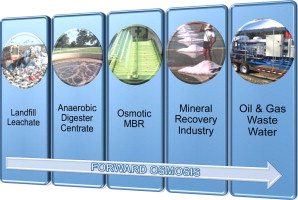
Global water scarcity and substantial challenges associated with the treatment of complex and impaired liquid streams have advanced the development of forward osmosis (FO), which can successfully treat and recover water for beneficial reuse.
Surging research and advances in FO technology, which was once unable to compete with conventional wastewater treatment processes, have identified its ‘sweet spot’: the treatment and desalination of complex industrial streams, and especially oil and gas (O&G) exploration and production wastewaters.
Many common treatment technologies are ineffective in this application, because of high salt concentrations, decentralised and transient operations, the presence of free and emulsified hydrocarbons, silts and clays leached from producing formations, and process additives common in O&G drilling wastewater and produced water.
Treatment and reuse of O&G wastewater, and other complex industrial streams, in a cost-effective and environmentally sound manner is critical for sustainable industrial development, and to meet increasingly stringent regulations.
This review by researchers in the US focuses on the successful development and demonstration of forward osmosis membrane treatment systems. It considers bench-scale, pilot, and demonstration studies on treatment of O&G waste streams, landfill leachates, centrate from anaerobic digesters, activated sludge in membrane bioreactors, and liquid foods and beverages.
In addition, recent developments in membrane fabrication, system configurations, and draw solutions are briefly reviewed.
Desalination, Volume 333, Issue 1, 15 January 2014, Pages 23–35.



